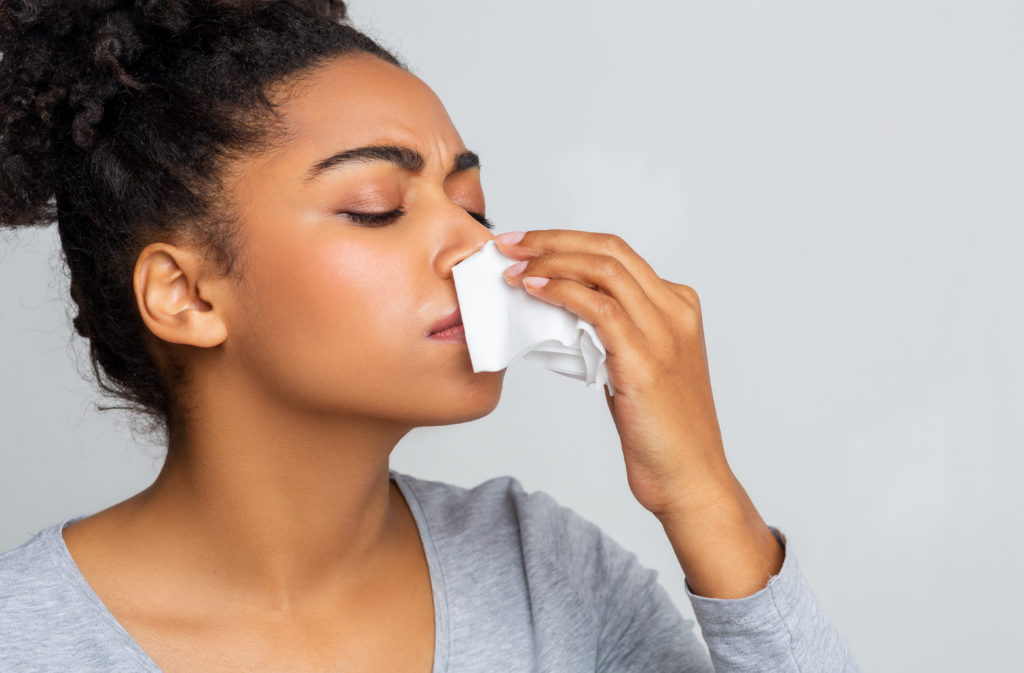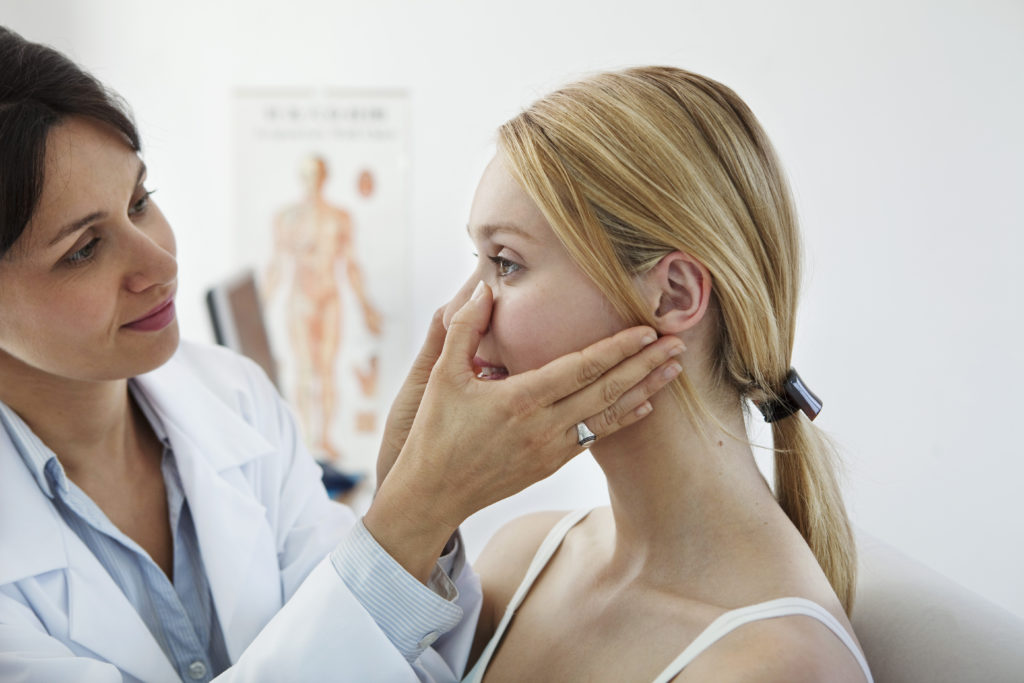October 25, 2022
5 ways to prevent nosebleeds from stress
Plenty of us get squeamish at the site of blood, especially if it’s our own. And it can be alarming if we start bleeding for no clear reason. Nosebleeds — more specifically stress nosebleeds — are often the culprit.
You could be standing in line at the grocery store, sitting at your desk or driving in your car when you suddenly feel a trickle — or maybe a small gush — of blood ooze out of your nostrils. The timing can be embarrassing and inconvenient. It will probably tick up your stress level a tad. Ironic, if the cause of your nosebleed is related to stress.
Can stress cause a nosebleed?
Yes, stress can contribute to nosebleeds. True, there are lots of other reasons you might suffer nosebleeds, so talk with your doctor if you have them often. Still, they can happen when a small blood vessel in the lining of the nose bursts. The rupture could be caused by one or more of the following:
- Allergies

- Infection
- Injury
- Medications
- Cold, dry air
- High altitudes
- Dehydration
- Excessive nose blowing or picking
Of course, lots of curious kiddos wind up in the emergency room or urgent care every year with a nosebleed caused by a Lego or marble stuck up the nose.
Added to this list of common causes is stress.
How, exactly, can stress cause nosebleeds?
When you are stressed, your body goes into fight-or-flight mode and releases a hormone called cortisol. Cortisol narrows blood vessels to redirect blood flow to your muscles. Flush with blood, your muscles then have the energy to either fight or flee from any perceived threat. Even the small vessels in your nose constrict. If one ruptures, then you have a stress nosebleed.
Your body rebels against stress in lots of ways. Along with stress nosebleeds, stress can cause headaches, anxiety, weight gain, high blood pressure, chest pains, sleepless nights and depression. How do you know if your nosebleed is stress related or caused by something else?
There are a few telltale signs that stress is to blame for your nosebleeds. Ask yourself these questions:
- Do you notice that your nosebleeds tend to happen when you’re feeling anxious or stressed?
- Do your nosebleeds stop after you take some time to relax and de-stress?
- Do you have other symptoms of stress, such as headaches or trouble sleeping?
If you answered yes to one or more, it could mean your nosebleeds are stress nosebleeds. If that’s the case, try these proactive steps to help keep them from happening.
5 ways to prevent nosebleeds from stress
Go into sleuth mode and find your triggers.
It’s important to identify triggers that may be causing your stress and stress nosebleeds. Understand what makes you feel tense, worried or angry. Knowing what kicks your body into fight-or-flight mode lets you come up with a plan to handle it.
Sharpen your chill skills.
Stress is a part of daily life. But when it becomes too intense, it hurts your body. Living in the fast lane leads to burnout. It also means you’re probably missing out on a lot of good stuff. Slowing things down can help you feel happier and more balanced. Try these steps to decompress:
- Talk or text with a friend
- Laugh out loud — every day
- Take deep-breathing breaks
- Listen to music you love
- Take a tech break and disconnect
- Hit the yoga mat or meditate
- Spend some time outdoors
- Eat healthy
- Get enough sleep
Water your nose.
OK, it may sound odd, but we mean it. Like most of your body — which is 55 to 60% water — the internal structures of your nose and sinuses need H2O. Water keeps nasal passages moist and flexible so when your body releases cortisol to constrict blood vessels, the tiny vessels in your nose have a better chance of not rupturing.
Start by drinking plenty of water each day. Most guidelines say to drink several cups of water per day. The exact amount depends on your weight, age, activity level, environment and any health issues you may have.
You may also want to use a saline spray. The spray can help keep your nasal passages moist and keep them from drying out and cracking. Spray saline solution into each nostril several times a day, or use a neti pot to rinse your nasal passages with saline solution.
Keep your nose cool and comfortable.
Hot water can dry out your nasal passages and make them more susceptible to bleeding. Take lukewarm showers instead, and use a humidifier in your home to keep the air moist.
Stay away from smoking.
Some people smoke as a stress-coping mechanism. But if you spend part of your day engulfed in a swirl of tobacco smoke, expect your nose to revolt. Tobacco smoke dries out your skin, eyes and the insides of your nose. It happens whether you are exposed to first-hand smoke or second-hand smoke. Both will dry out the inside of your nose and boost your risk for nosebleeds.
Give your nose a little TLC.
Of course, if you do suffer from stress nosebleeds, it’s important to know what to do to stop them when they happen. Remember, when your nose bleeds, it may seem like there is a lot of blood, even if you just need a few tissues or a wet paper towel to stop it.
Medical experts say a nose bleed isn’t serious unless it’s like a leaky faucet that won’t stop. If you can fill a cup with blood, then a trip to the emergency room or your primary care physician is the best course of action.
A stress nosebleed is likely to be a minor amount of blood. Here’s what you should do to stop it:
- Sit up straight.
- Tilt your head slightly forward.
- Pinch your nose shut.
- Breathe in and out slowly through your mouth.
You may need to pinch your nose shut for a full 10 minutes before the blood flow slows or stops.
When to see your doctor.
If you have frequent or severe nosebleeds, talk with your doctor. It’s important to rule out any underlying medical conditions.  While a minor nosebleed might not be cause for alarm, excessive or frequent bleeds can be a sign of a more serious health issue.
While a minor nosebleed might not be cause for alarm, excessive or frequent bleeds can be a sign of a more serious health issue.
And if your nosebleeds are truly stress nosebleeds, talk to your doctor about treatment options for managing long lasting stress and anxiety. By taking steps to lower stress, you can help stop nosebleeds and other stress-related health problems from happening. In fact, it’s a good idea to stay on top of all your regular wellness checks. It’s the best way to make sure health issues are found early when they can be treated more easily.
DISCLAIMER
The information featured in this site is general in nature. The site provides health information designed to complement your personal health management. It does not provide medical advice or health services and is not meant to replace professional advice or imply coverage of specific clinical services or products. The inclusion of links to other web sites does not imply any endorsement of the material on such websites.



